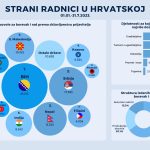April 4, 2018 – An email to the TCN inbox:
“I was inspired by your article “Glasovi iz lude kuće: promjena smjera…” to write something that would give more insight about the situation in Croatia to its “diaspora” people, especially as you mentioned that many of them don’t have much chance to read independent news in English. My article is not about a specific person or event, more about overall reality here, but I hope it will be interesting enough.” Our correspondent requested that the article be published anonymously.
While reading Paul Bradbury’s account of slowly coming to terms with the dark side of Croatia, I was remembering my own slow awakening to the reality of the country I was born and raised in. These days, listening to certain representatives of the diaspora in the Croatian Parliament making foam-in-the-mouth speeches about supposed communists’ children while ignoring very real corruption and crime in every segment of the government, it can be difficult not to feel certain resentment for the diaspora, even if local politicians are rarely any better. While plenty of Croatian voters apparently see their interest in keeping a heavily corrupt government in power, many of us wonder why is it so important to people who don’t live here, weren’t even born here, and don’t feel the consequences?
Some articles on TCN also helped me realize that many people in diaspora still seem to believe that the key problems of Croatia are communists and their children against “true patriots”. In a way, this is true… but the heritage of communism (and a long history that preceded it, too) is in different places than it’s presented to them.
I grew up in a family that was modest and honest, had high ethical standards and placed a lot of value on intellectual independence, hard work, not asking for much in return, and above all, responsibility. While I didn’t always like my parents’ methods in teaching me those values, I could see even as a child how such values made sense and could make the world better. It seemed obvious that other people would think the same way, except perhaps an occasional psychopath. All the wars and injustice we learned about in history classes seemed to my child self like acts of unevolved ignorants, and I deeply believed people were much more educated and intelligent now to allow such things to happen again.
One of my grandfathers, on the other hand, was my parents’ exact opposite: self-centered, manipulative, obsessed with material gain, and he even boasted to me once how he barely ever worked throughout his life – he was employed, but kept abusing the system by taking long and frequent sick leaves while still receiving his salary. In reality, he was one of the physically healthiest people I ever met, even in quite old age. Whether he bribed a doctor, or had connections, or was just a very good actor, it didn’t cross my mind to ask; I thought he was weird and tried to avoid him as much as possible. He was also, even in socialist times, very religious but only in terms of religious formalities. The hypocrisy of his behavior was clear even to my child self. My parents would shrug and tell me to just bear with it for a short holiday visit, after which it was easy to forget about him. For a long time, I perceived him as an exception in Croatia, and indeed humanity, as I barely even thought about separate countries and nations.
The war in 1991 erupted just as I started high school, and while it shook my world somewhat, I wasn’t in any direct danger and my reality filters were already strong enough to help me perceive it as just a temporary madness perpetrated by mostly heavily manipulated people led by a few psychos. News of massacres and refugees entwined with the news of factories being closed and people losing jobs even in parts of Croatia the war couldn’t reach. We didn’t have internet yet, and independent news was rare, so I had no idea at the time about Tuđman’s idea about 200 rich families that would rule Croatia (feudalism, anybody?), and why nobody in power objected against factories being pushed into debt and bankrupted by a few people who seemed to come out of nowhere and got rich overnight, while labourers were laid off without any scruples.
I knew there were shady things going on, but my idealistic youthful self believed it was only a small number of people abusing the chaos of war. Even after the war, when rumours about ever-inflating numbers of fake war veterans applying for big pensions and vast other benefits (for their families and children, too) became stronger and stronger, I still believed it was just an anomaly that would disperse with time. I did wonder why the government didn’t seem at all concerned about such mass abuse of veteran privileges. It didn’t occur to me then that it might have been allowed on purpose, to create a strong, financially dependent base of faithful voters.
I was a student, full of hope for future and humanity once the war was finished, and while news about corruption affairs and nepotism kept being drowned in a nationalistic frenzy, I still deeply believed that most people value fairness and integrity. I did wonder why so many people tolerated such a corrupt government, and I thought it must be because the war was still fresh in their minds and they simply didn’t want to see what the party that “created Croatia” was doing. Some people fit that description, I guess – and indeed, the support of HDZ, Tuđman’s party has dropped from cca 90% during the war and cca 60% when I was a student to only about 30% of voters nowadays, which is still enough to keep them in power as there is no quality opposition (in other words, most other parties just want the same as HDZ: to put their own members on important positions and jobs, rather than make life better for the rest of the people).
If somebody told me at the time that many voters were driven by personal interests and hope that they or someone in their family would get a “piece of the cake”, or at least a well-paid, low responsibility government job by being in the “right” party, I wonder if I’d have believed that. As the internet was spreading like wildfire, I believed it would provide the education and information needed for people to recognize what’s going on and to change it.
I knew, of course, about nepotism, and heard stray comments about “communist mentality” but I just didn’t know enough such cases to realize how widespread it is. As my parents always despised relying on “connections”, and would become deeply irritated at even a hint of a self-serving attitude, I believed most parents were like that, and consequently, most of their children. It took at least 10 more years to realize that some parents not just tolerate, but encourage self-serving attitude in their children, as long as directed towards people outside of their narrow “tribe”. To think that we are all the same tribe, and we all suffer the consequences, doesn’t seem to matter to people who think short-term.
A key piece of the puzzle fell in when I read someone’s thought that nations which were oppressed under foreign rule through most of their history, learn to survive by cheating, avoiding laws and exploiting the system. In fact, it becomes not just a way to survive, but a matter of personal (and sometimes collective) pride, “sticking it to the man”. It certainly somewhat explains my grandfather’s pride in cheating the system all his life. Croatian history certainly fits that description, in fact, “centuries of desire for sovereignty” is a commonly heard phrase in modern nationalistic speeches. However, some people seem to have extended such an attitude into a belief that honesty and responsibility are signs of weakness rather than strength.
Disregard of imposed laws has become a way to live for many past generations, and getting away with it has become a proof of cosmic justice. Like many other traditions, this one has also lost its historic origins and became its own purpose. Many Croatians, in a way, collectively don’t seem to realize they do have their own state now, and the only people they cheat are themselves and their own children, at least in the long run. If nothing else, by training their descendants to rely on the state and connections rather than their own work and abilities, they train them to be dependent on others. With so many government workers, often on jobs created only for the purpose of nepotism, retired people and war veterans (and even more “veterans”) depending on other people’s work, and many people who actually want to work leaving the country, the whole system is completely unsustainable. The government will first sell whatever is left that is valuable, even natural resources, they will probably slap new taxes on remaining working people and reduce any money that goes to anybody who is not likely to vote for them out of financial interest. But even that cannot last long.
At the moment, the Croatian government, supported by and financially bonded to Church, is doing whatever it can to create a belief in their voters that there is still an enemy to defeat, that there is still some oppressive power to oppose. That’s why so many people still talk angrily about communists and, more and more lately, “directions from Brussels or USA” or even Soros, that omnipresent scapegoat.
Yet today, the government and its dependents treat their own people as the enemy to be exploited and defeated; small business owners and anybody without political connections and power, who can be squeezed for that little leftover money they have, sometimes even out of their only place to live, and so provide yet another year of financing the privileged. Small businesses are slapped with disproportionately high fines for ridiculously banal mistakes, while poor people are pushed into debt slavery by high interest rates on initially small debts. Some people (including myself once) have to wait for a few years for important documents, just because a politically connected “uhljeb” doesn’t feel like working more than a few hours a week. Fatally ill children are denied expensive medicine and pushed into being test subjects for a new medicine instead, which is presented as a “favor” to them. Again, if it all reminds you of feudalism, I’d agree with you. Sometimes when I read the news, I feel surrounded by my “grandfathers”.
In short, the only real enemies are selfishness and corruption, and the only real struggle is between hardworking and responsible people, and those who want to live off others’ work.
There are honest and hard-working people in Croatia, probably many more than this article might make it seem. Also, most people, especially in small villages, are meticulously honest with their neighbors. But the network of corruption has become too dense to allow capable people to realize their potential, and too often even top scientists and other experts are actively oppressed by either someone’s selfish interests or envy. If Croatians truly want the kind of a country they claim they want, they need to collectively learn that tribalism, nepotism and corruption (or apathy, on the other side) are not survival strategies anymore, but weaknesses.









